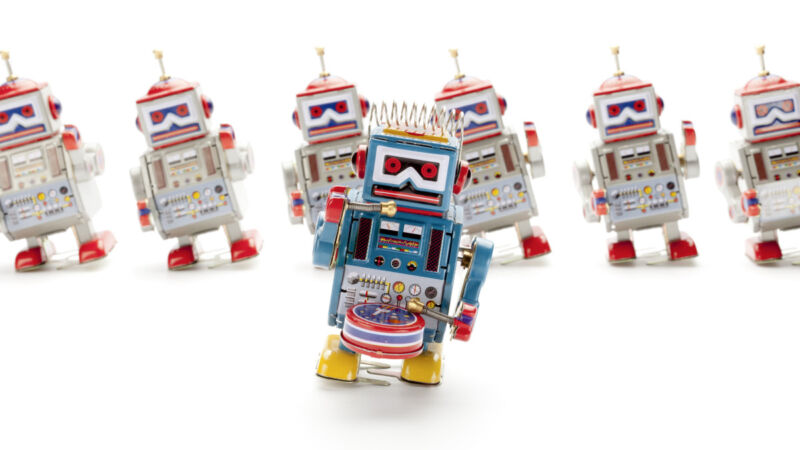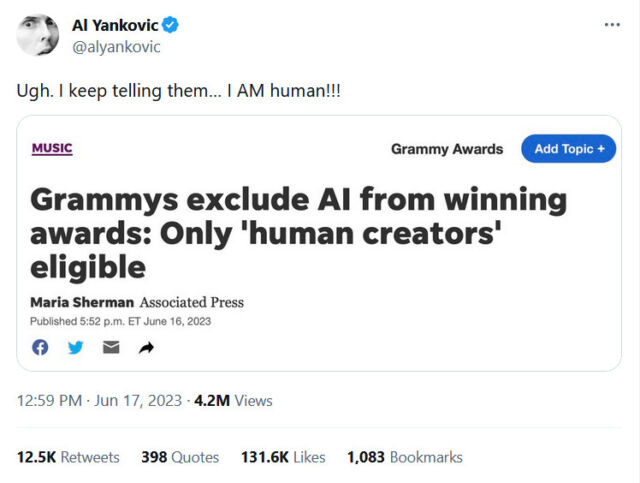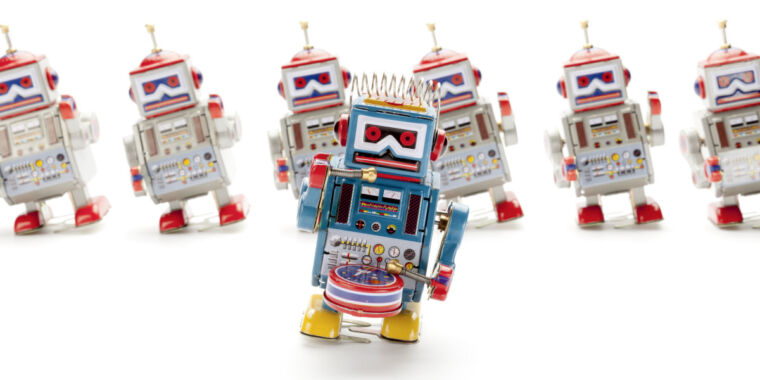
Getty Images
Amid the increasing use of generative AI in music, the Recording Academy has updated its rules for the 66th Annual Grammy Awards regarding the role of AI in considered works, Reuters reports. To be eligible for an award, a song must have meaningful human authorship. Purely algorithmically generated music cannot win a Grammy.
According to the 66th Grammy Awards Rules & Guidelines booklet, works generated exclusively by AI are not eligible for the awards. However, the academy does not completely rule out the possible role of AI in the creation process. Works that contain elements of “AI-generated material” are eligible if they meet two main criteria, and we will quote the booklet itself:
- “The human-written components of the work must be meaningful and more than ‘de minimis.'” (The booklet defines “de minimis” as “without meaning or importance, or so small as to be worth ignoring.”)
- “These human-written components must be relevant to the category in which the work is entered. For example, if the work is entered in a songwriting category, there must be significant human authorship involved in the music and/or lyrics. The same is true for a performance category, the human performance element must be significant.”
The rules also state that if a piece of work contains AI-generated material, the individuals or teams that programmed or operated the AI to generate that material cannot be considered for a Grammy award based on that contribution. In other words, if a song uses AI to generate a melody, lyrics, or any other element, the people who created or used the AI won’t get a Grammy fee for that particular AI-generated part. The credit and potential for nomination or award receipt go to the human elements that make significant contributions to the song.
AI in music can take different forms. Over the past year, we’ve seen increasing advances in AI models that can create complete audio compositions from scratch based on text descriptions, such as Riffusion, Google’s MusicLM, and Meta’s more recently announced MusicGen. Under these rules, songs created with only those tools (or similar tools) would not qualify for a Grammy award, assuming they were good enough.
On the other hand, we also reported that The Beatles used AI to remaster songs and possibly pull vocals from a demo tape for use in a “final” Beatles song. In those cases, since the AI would be limited to processing the audio rather than generating a composition or performance from scratch, we would assume that the resulting songs or albums would still be Grammy eligible in most categories considerations.
Somewhere in between is the use of generative AI tools such as vocal generators in songs. In those cases, the AI singer could not win an award in a category that awards vocal performances, but if the song still contains substantial human creative elements, the song could potentially win in another category that takes into account human contributions to the song , even with an AI vocal track.
Here’s the full list of the new AI rules, listed in a new section called “Generative AI”:
The GRAMMY Award recognizes creative excellence. Only human creators are eligible to be considered for, be nominated for, or win a GRAMMY Award. A work that does not contain human authorship does not qualify in any category. A work containing elements of AI material (i.e. material generated through the use of artificial intelligence technology) qualifies for applicable categories; however: (1) the human authorship component of the submitted work must be meaningful and more than de minimis; (2) such component of human authorship must be relevant to the category in which such work is included (for example, if the work is entered in a songwriting category, there must be meaningful and more than de minimis human authorship with respect to the music and/or lyrics; if the work is entered in a performance category, there must be meaningful and more than de minimis human authorship with respect to the performance); and (3) the author(s) of any AI material included in the work are not eligible to be nominees or GRAMMY recipients to the extent of their contribution to the portion of the work resulting from such AI material. material exists. De minimis is defined as the lack of meaning or importance; so small that it is worth neglecting.
As AI increasingly emerges as a creative yet controversial tool in the arts, the introduction of the Grammy rule serves as a remarkable statement about the importance of human creativity in the music industry. While generative AI may one day have the capacity to create impressive compositions, the Grammy stage remains largely reserved for human artists for now.
And while AI-powered rock stars don’t have to apply, an “Al” as in “Alfred” star made a joke about the new rules on Twitter.

The 66th annual Grammy Awards will take place in 2024.

